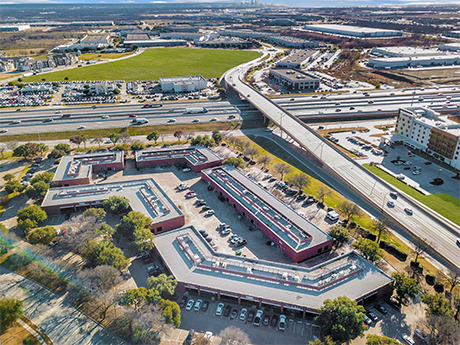By Jason Baxter, president and CEO, Fort Capital
While some might think that industrial warehouses are overflowing with e-commerce tenants, in Fort Worth, we have seen another tenant mix grow at an even more rapid pace: service providers. These are the plumbers, landscapers and electricians that work behind the scenes to keep cities running.
With population growth skyrocketing in Fort Worth, the industrial space needed by these service providers is also growing at a rapid rate.

Jason Baxter, Fort Capital
According to the U.S. Census Bureau’s latest population estimates, Fort Worth’s population increase was the third-largest in the country between 2019 and 2020, a period during which the city added more than 19,000 new residents. This increase allowed Fort Worth to jump from No. 13 to No. 12 in terms of the largest U.S. cities based on population.
We often forget that population growth at this scale impacts all facets of real estate — housing, office, entertainment, industrial. Each of these uses requires various types of service providers to maintain.
Fort Worth and similar fast-growing markets do not have enough space to support this growing segment of the tenant base in addition to the e-commerce and logistics users that have become the face of industrial real estate.
Supply chain disruption on a global scale only exacerbates this problem, as tenants have a harder time mapping out timelines for occupancy and expansion due to uncertainty about when their supplies and equipment will be on hand.
At least in Fort Worth, service providers typically occupy Class B industrial buildings, and these assets are depleting and irreplaceable. Due to high costs of land construction, as well as location/zoning restrictions, it is impossible to recreate these types of assets — especially within city limits.
While there was a lack of inventory before this surge in population growth, now the industrial market is bursting at the seams, leaving no choice for these service providers but to expand into the suburbs of Tarrant County. This is a temporary solution, as this inventory problem extends to the entire metroplex. Based on this trend, we have expanded our search for investment opportunities to these surrounding areas.
The lack of supply relative to demand is hardly limited to the Class B segment of the market, however. Across numerous submarkets, valuations of industrial assets are reaching historic highs as tenants seek to be in prominent locations from which they can easily serve growing populations. Since we first started targeting industrial assets in this market in 2015, the scale and speed of the industrial growth story in this city has not been lost on us.
Operating in 2022
On top of inventory challenges, these tenants are facing barriers on the service side as well. Within the Class B industrial space, we’ve witnessed an overall lack of sophistication within the level of property management that is typically provided.
These assets have historically had less-sophisticated owners who either chose the cheapest property management service or operated the asset themselves, even though they were not equipped to manage the unique challenges that come with managing Class B industrial properties.
Our company has dealt with this firsthand. After repeated struggles to identify property management partners that could uphold our standards, we created our own property management arm, FCP Management. This branch is dedicated to operating assets with excellence and providing the absolute best service to each of our tenants and partners.
From a technology perspective, the industrial real estate industry has had a difficult time moving into the 21st century, with many tenants still expecting to hand deliver rent checks each month to their property managers. To facilitate operational processes like these, we and other third-party management services have introduced customized portals through which they can pay their rent online, update contact information and even submit maintenance requests leading to faster resolutions.
— This article originally appeared in the June 2022 issue of Texas Real Estate Business magazine.


